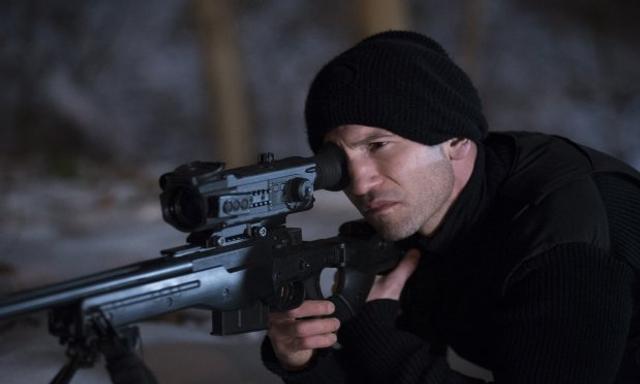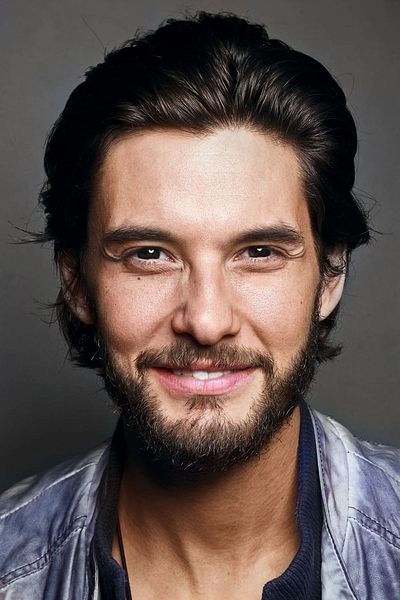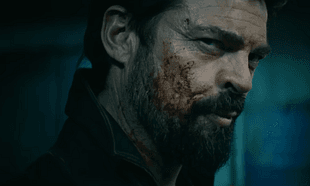It really is a testament to how much of an impact Jon Bernthal's performance as The Punisher had in an otherwise middling second season of Daredevil that we now have an entire series built around the character.
Whether Marvel's television arm planned it or not is unknown, but the fan reaction to him was such that it practically demanded it. Now that it's here, it seems funny to think that he occupies the same universe as Iron Fist, Luke Cage or even the likes of Captain America, Thor and The Incredible Hulk. As it's been said many times before, a comic-book adaptation works best when it's confined to a genre and that applies to evenly to television and the movies. Luke Cage was a social drama with blaxploitation elements, Jessica Jones was a detective noir with an undercurrent about rape and dominance of women, and now The Punisher works a line somewhere between John Wick's balls-out action and Ted Kotcheff's harrowing thriller First Blood.
At its most basic core concept, The Punisher isn't so much about revenge or violence, but is instead about those left behind by it. The opening episodes pivot completely away from the criminal gangs of Daredevil et al and instead gives us an insight into how Frank Castle became the one-man army we know of yore. Jon Bernthal's icy demenaour belies someone who is struggling desperately to keep a lid on his directionless rage, and you see him impotently hammering away at bricks and mortar in order to focus it somewhere. It's not before long that he's found by David "Micro" Lieberman, an Edward Snowden-type whistleblower - played by Girls alum Ebon Moss-Bachrach - which sets the main storyline off and running.
Like so many Marvel / Netflix efforts prior to this, there's a major problem with wheel-spinning and pacing. Why Netflix orders thirteen episodes when eight or nine will do remains a mystery, but it does serve to contextualise the violence - and there is a huge amount of violence in this - and give added depth and texture to each and every character; almost to the point where it feels unnecessary. Thankfully, these stray strands and subplots begin to intertwine after a few episodes and you'll eventually be able to see the tapestry of it all - and it's a pretty bleak one at that.
After watching through the entire series, it makes complete sense that Netflix and Marvel decided to hold off promotional events in light of the Las Vegas mass shooting. Now that it arrives less than a month after another mass shooting means that there'll never be a good time in America to release something like this. Indeed, an entire subplot is devoted to a psychologically-damaged veteran who begins to explore far more extreme methods, seemingly inspired by Castle's own brand of justice. It's pretty brave stuff to do, especially in the current climate, but it handles it well enough despite a certain lack of tactfulness with it. In fact, a lot of themes and metaphors that are used throughout the series are about as subtle as a bullet to the face. The opening episode sees Castle's former comrade leading a therapy session talking about a soldier stuck in a hole with no way out, and by the end, we see Castle dumping bad guys into a literal cement hole. Moreover, the references throughout aren't particularly graceful either, calling on everything from Full Metal Jacket, Marathon Man, Bullitt (for a car chase), the aforementioned First Blood and John Wick (it even has the same composer as John Wick too).
What you're really signing up for with The Punisher is the performances, and Bernthal as the series lead is utterly electric. Even when his character is off the boil and not firing huge machine guns, Bernthal delivers each and every scene with the same intensity. This is in direct contrast with Ebon Moss-Bachrach as Micro, who plays his character almost like a good-natured but troubled hippy. The dynamic that develops over the course of a few episodes has an authenticity to it, and the back-and-forth dialogue between them has flashes of humour and real heart to it that serves as the series' bedrock. Ben Barnes, meanwhile, delivers a nuanced performance as the oily BIlly Russo, Castle's former compatriot who's just a little too good at playing nice and being amiable. Sopranos alum Paul Schulze, meanwhile, turns up as Agent Orange, Castle's former CIA handler and perfectly encapsulates bureaucratic arrogance. Amber Rose Revah, meanwhile, delivers a somewhat stilted performance as a Homeland Security agent investigating both Lieberman and Castle.
By and large, the direction across the series is sharp, utilitarian and crisp that aligns with the overall gritty, real-world feel. Two episodes in particular - Gunner and Danger Close, both helmed by Irish directors Dearbhla Walsh and Jim O'Hanlon - stand out not just as the best in the series, but some of the best episodes in Marvel's television efforts. Gunner, in particular, has a thrilling sequence set inside a woodland area ala First Blood, whilst Danger Close works along the lines of Rashomon and features a stunning performance by supporting castmember Daniel Webber.
Aside from the usual caveats placed on Marvel Netflix shows - namely, it's about three episodes too long - The Punisher ranks as the strongest effort of the partnership since Jessica Jones or Daredevil.




















































































